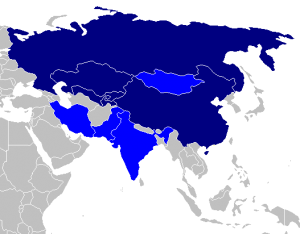First off, my friends at Rising Powers beat me to a SCO Summit report.
In the shadow of the Iranian election drama and the first real BRIC get together, the Shanghai Cooperation Organization (Don’t know what the SCO is?) held their annual Heads of State Summit in the Russian Ural city of Yekaterinburg. The Heads of State of China, Russia, Kazakhstan, Tajikistan, Uzbekistan, and Kyrgyzstan came together to…well…make many placid statements and reaffirm the organization’s importance. Also in attendance were SCO Observer State leaders, including India’s Singh, Pakistan’s Zardari, Afghan’s Karzai, and Iran’s completely non-controversial leader, Ahmadinejad, who just made a quick appearance as he had to go back to Iran to check on his plants or something. Let’s go through some of the more interesting and consequential statements and actions from the Summit:
Pakistan’s Zardari and India’s Singh met on the side to discuss relations, but one should not assume that this is the beginning of a serious thaw in the belligerent states’ future. However, the SCO does prove useful in getting these two leaders together in a format that doesn’t focus on their disagreements.
Most of these next items can be found in the official Yekaterinburg Declaration:
The Declaration opens with this grand statement about the evolving global landscape and expresses the members’ preference for a world based not quite on US supremacy…
‘Serious changes are taking place in the modern international environment. Aspiration to peace and sustainable development, promotion of equal cooperation became the spirit of the times. The tendency towards true multipolarity is irreversible.’
After one is done grappling with the ‘spirit of the times’ reference, you can focus on the meat of the statement, which is that the world is affirmatively heading in a multipolar direction and that this is very much a good thing. As much as its members attempt to deflect accusations that the SCO is a bloc against the US/West/NATO, they keep coming up with these statements that completely say otherwise.
By far the prominent issue discussed during the summit was the global financial crisis and the Declaration called for stronger financial regulation, the possible creation of a new financial regime to perform this, and called for greater economic cooperation between SCO members within the SCO framework. In regards to the last point, since the SCO’s creation in 1996 (current form in 2001) economic relations and trade between its members has indeed increased, but this has mostly been done on a bilateral basis, with China’s economic relations with the CA states being the most transformed. China’s trade with Russia is rather stagnant, mainly just military goods, and Russia’s recession has made life there let’s just say ‘unfriendly’ for many Uzbeks, Kazaks, etc. who migrate to the country up north to find better paying jobs. However, there was a significant move made by China that may actually have an impact on SCO member states personal economic problems, and that is the promise of $10 billion dollars in loans provided by Beijing for the Central Asian states. This move personifies Beijing’s dollar diplomacy to increase its footprint beyond its borders. The CA states are facing economic turmoil, that they very much desire to keep from becoming political/social upheaval, and China’s got the reserves to bail them out. This has to make Moscow feel increasingly nervous about its own regional influence.
The SCO, which itself states that it has global ambitions, really only concentrates on looking west from China and south from Russia. That is why I was not surprised that though the group contains North Korea’s neighbors Russia and China and is ostensibly a security grouping, the Summit barely mentioned or discussed the Korean Peninsula’s strategic situation. The Summit’s Declaration placidly stated that the SCO would ‘stand up for resuming the process of negotiations on the denuclearization of the Korean peninsula. They call to show restraint and continue the search for mutually acceptable solutions on the basis of the previously reached agreements.’ A whole lot of feeble ‘blah, blah, blah’ as far as I’m concerned. The SCO as a group is concerned about keeping peace and stability in Central Asia and hopefully pushing the group’s influence further west into Afghanistan and that is why North Korea, Japan, etc. have not been high on the agenda.

Speaking of nukes and Central Asia, the SCO Heads of State promoted the Treaty on Establishing a Nuclear Free Zone in Central Asia, which was apparently put into effect March 2009. The region’s been free of nukes since Kazakhstan returned their Soviet controlled weapons in the 1990s. Of course the Stans are surrounded by nuclear powers (Pakistan, India, Russia, China) with Iran working their way into the club as we speak. Speaking of Tehran, the SCO state leaders had nothing specific to say regarding the country’s nuclear ambitions. The members did applaud US-Russian efforts to reduce and secure their nuclear weapons arsenals.
The Republic of Belarus and the Democratic Socialist Republic of Sri Lanka were welcomed into the SCO framework as Dialogue Members. They will get to attend meetings, but have no say into the organization’s decisions. Geographically this spreads SCO affiliated members closer to Europe and into the Indian Ocean.
Lastly, the SCO member states used the example of the joint counter-terrorism exercise of “Norak-Anti-Terror-2009” held last April in the Tajikistan to show their growing cohesiveness and capabilities in terms of regional security and cooperation. I’m not sure how large these ‘exercises’ were, but it is safe to say they were of smaller scale than both Peace Mission 2005 and 2007. One can be sure that SCO member state autocrats see these exercises as possible defense measures against domestic political and social revolts just as much against terrorist attacks, with the protests in Iran being way too close for comfort.
Don’t forget to check out my Afghanistan and Great Power Politics blog.